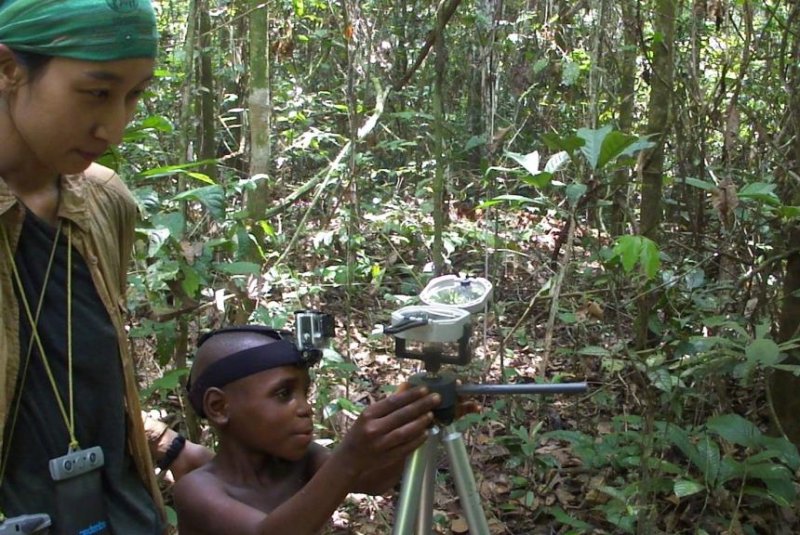A young Mbendjele boy is pictured pointing at a food location in the tropical rainforest of the Republic of Congo, while researcher Haneul Jang tests his accuracy. Photo by Karline Janmaat
July 24 (UPI) -- Most people rely on their smart phones to point themselves in the right direction, but not the rainforest-dwelling Mbendjele BaYaka people of the Republic of Congo.
According to a new study, the indigenous foragers are quite adept at using the sun to orient themselves in the Congo's dense lowland forests.
To better understand the navigational abilities of the Mbendjele BaYaka people, researchers had men, women and children point out a series of distant, out-of-sight locations while moving through the forest. Because the forests where the Mbendjele BaYaka live are flat and full of vegetation, without large geographical features for orientation, the foragers must use the sun to make their way to different destinations, whether to find food or get home.
Researchers conducted 600 pointing tests with 54 Mbendjele BaYaka men, women and children between the ages of 6 and 76 years old. The test-takers pointed to 60 different rainforest locations.
The results, detailed this week in the journal Proceedings of the Royal Society B, showed the Mbendjele BaYaka people have remarkable orientation skills -- a talent that is acquired and nurtured from a young age.
"Gender equality in the Mbendjele BaYaka population may result in Mbendjele women's long-distance foraging for fishing and hunting as do men," lead researcher Haneul Jang, scientist at the Max Planck Institute for Evolutionary Anthropology, said in a news release. "This might allow women and men to develop similar orientation abilities. Our results are consistent with previous studies that found no sex differences in orientation abilities in hunter-gatherer societies where both sexes actively travel away from home."
In many other societies, women are more likely to work at home or close to home. Not so for Mbendjele women.
"We observed that Mbendjele men and women travel equally far from home, and it is therefore perhaps not surprising that they score equally well in orientation tasks," said researcher Karline Janmaat. "The results of our study confirm how important experience is for our cognitive development."
Test results showed that by age six, Mbendjele were as accurate as adults at pointing to out-of-sight locations. However, researchers found the orientation ability of children was more reliant on the sun, whereas adults maintained their orientation accuracy on cloudy days.
"Unlike the adults, who have a very good sense of direction in distant areas even if they cannot see the sun's position, the children make large pointing errors in less familiar areas when they cannot see the sun," Jang said. "However, if they can see the sun, children's performances improve considerably."
According to the study's authors, their paper is the first to document the sun compass use in humans.
"We know that bees can use the sun to navigate, but surprisingly there has been no scientific evidence yet that humans may have this skill, too, and that children may develop this skill by age six," Janmaat said. "Our study shows that there is still so much to discover and with a high level of urgency. All forests inhabited by human rainforest foragers in Congo have been sold to foreign companies, causing these people to lose not only their foraging grounds, but their intriguing navigation skills as well."















